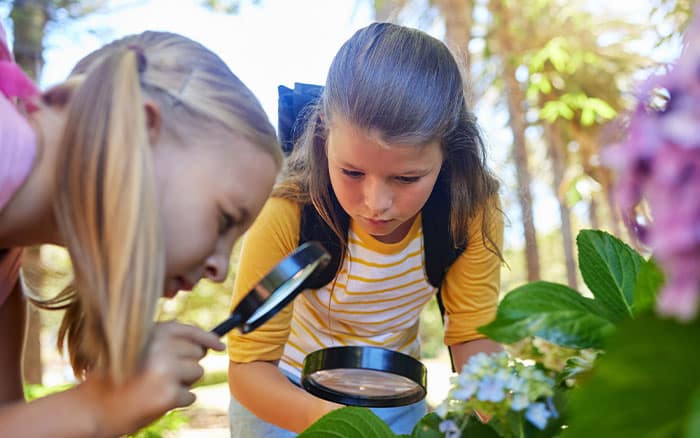Consider planting for scent, there are more benefits than just an attractive smell. There are proven mental and physical benefits of immersing yourself in pleasant aromas. And I can show you how to boost your health with scent through growing your own.
What are the health effects of aromas?
A study by Brown University in 2009 found that scents have genuine, powerful effects on our bodies and minds. Inhaling fragrances can significantly affect our mood, ability to cope with stress, reduce chronic pain, and physical cravings.

As well as influencing our heart and breathing rates, blood pressure and even markers for inflammation in our blood. Smells, science tells us, can lift us up or bring us down.
Interestingly, the health benefits of most smells are not produced by the physical interaction of the scent with our body. Most inhaled fragrances don’t cross over into the bloodstream in large enough amounts to affect our physiology on their own.
So too, researchers from Marywood University in Pennsylvania found that the same fragrance can actually cause opposite effects. Slowing down heart rate when people expect it to be relaxing but speeding it up when they expect it to be stimulating.
This suggests it’s not the chemistry of the fragrance that’s doing the legwork.
How do scents produce their effects?
So, how do fragrances produce their effects? A body of research proposes that aromas acquire their effects by ‘learned association.’ That is, from our undergoing experiences that link an aroma with a particular feeling or bodily state.
Incredibly, once our experience has linked a scent with an experience, the scent can cause us to undergo the emotional and physical changes that the experience itself did originally.
The scent of, say, Lavendula Angustifolio (lavender) really is relaxing for some people—reducing their heart rate, lowering their blood pressure and improving mood. But only because they’ve learnt to associate this scent with relaxation.
Perhaps they use a lavender-scented bath soak, visit an aromatherapist, or have spent long summer evenings relaxing in a garden full of lavender. It doesn’t matter how this association was formed, once it’s there, the fragrance of lavender alone can produce astonishingly relaxing effects.

What fragrances have positive personal associations?

This means that there is no one-size-fits-all when it comes to aroma. For me, the scent of cut grass is an uplifting, welcoming smell. I associate it with playing outside as a child, a happy memory.
However, for a hay fever sufferer whose allergies are set off by the pollen that is kicked up when the grass is cut, the same smell may heighten anxiety. Choosing to garden with fragrances that you, personally, enjoy is a must when harnessing scent for health.
Getting a whiff of something that has generic positive associations for you has especially powerful health benefits.
So, if the hot, heavy perfume of tomato plants growing in a greenhouse reminds you of the precise moment that brings you joy, the health benefits will be that much more pronounced.
Great news for lucky people who have many happy memories surrounding the fragrances of gardening!
How to Grow Your Own fragrances to benefit your health
Choosing to garden with fragrances you like and that evoke happy memories for you, will provide a myriad of health benefits. And, quite frankly, who doesn’t want lower stress levels, better coping mechanisms and to be in a better mood?
Indeed, studies show that not only does being in a better mood feel good in itself, it also has knock-on benefits. It increases your productivity, ability to cope in emotionally-fraught situations and your tendency to help others.
Additionally, when you’re more productive, emotionally resilient and helpful, this puts you in an even better mood.
Here’s how to harness scent for health when growing your own:

2. Job’s a good-un
Plants aren’t the only way to incorporate scent into your gardening regimen. Love the sweet scent of rotting compost? Get a compost bin. Enjoy the fragrance of an open bee hive? Consider bee-keeping. Include your own personal favourites in your routine.

3. Choose the right spot
Think not only about what to choose, but where to put it. At the entrance to your allotment, in hanging baskets fixed to your shed, along your garden path—put pleasant aromas in your way and get a health boost every time you brush past them.

4. Plant for the plate
Many things that don’t have a scent while growing release incredible aromas when picked, sliced or cooked. Be it the sweet scent of honey-roasted parsnips, the heady perfume of freshly picked rosemary or the mouth-watering aroma of garlic cooking the pan. Choose produce that delights come cropping time.

5. Look to the future
If you have children in your life, create positive associations with gardening fragrances that will last a lifetime. Get them pinching out tomatoes, snipping herbs for dinner, putting food scraps in the wormery—anything that exposes them to aromas in a fun and interesting way.
Beautiful perfumes can have a positive impact that goes far beyond putting a smile on your face on the allotment. Find a way to include your own personal favourites in your routine and you’ll improve your emotional and physical well-being.

Leave A Comment